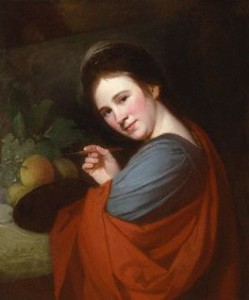Yes- I guess we unanimously agree that the National Portrait Gallery was filled with portraits of the white and wealthy. There were no representations of middle or lower class, or any people of color, which didn’t come as a surprise to me. If you weren’t royalty or didn’t have a consistent money flow, you most definitely had no chance of getting your portrait done; hence no people of color. I was however pleasantly surprised with the amount of portraits of women- I expected it to be much less. There were a number of beautifully depicted portraits of women in intricately designed gowns that probably made every woman wonder what it would be like to have been in their shoes. As I began to take a closer look at each woman’s face, I noticed a similar characteristic; a majority of them were extremely pale and emotionless. After a while, I began to realize they all had to same face and the only things that differed were the color of the background, hairstyle, and attire.
As I was just about getting fed up with seeing identical miserable portraits, I came across a portrait of Mary Moser by George Romney in 1770
.
(Taken from the National Portrait Gallery)
Mary was an English painter and one of the most celebrated women artists. Very popular in the 18h century, Mary was known for her depictions of flowers and had been recognized as an artist since the young age of 14. I was thrilled to see a woman who was an individual and tapped into her own talent to make a living, instead of sitting upon hereditary wealth. Romney did an excellent job in captivating Mary doing what she loved while expressing the happy look upon her face. So in the end, I didn’t walk out of the National Portrait Gallery completely disappointed as I envisioned.
